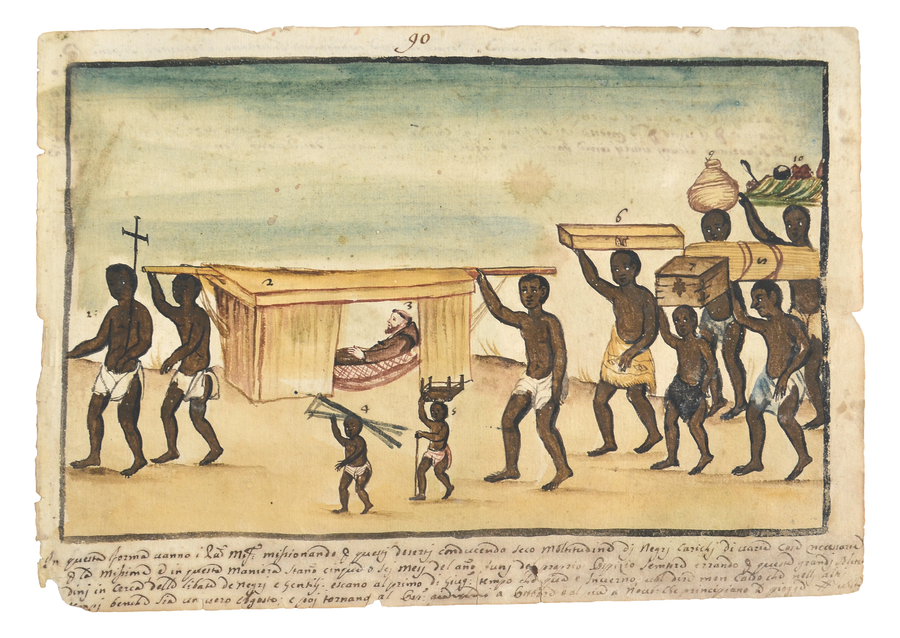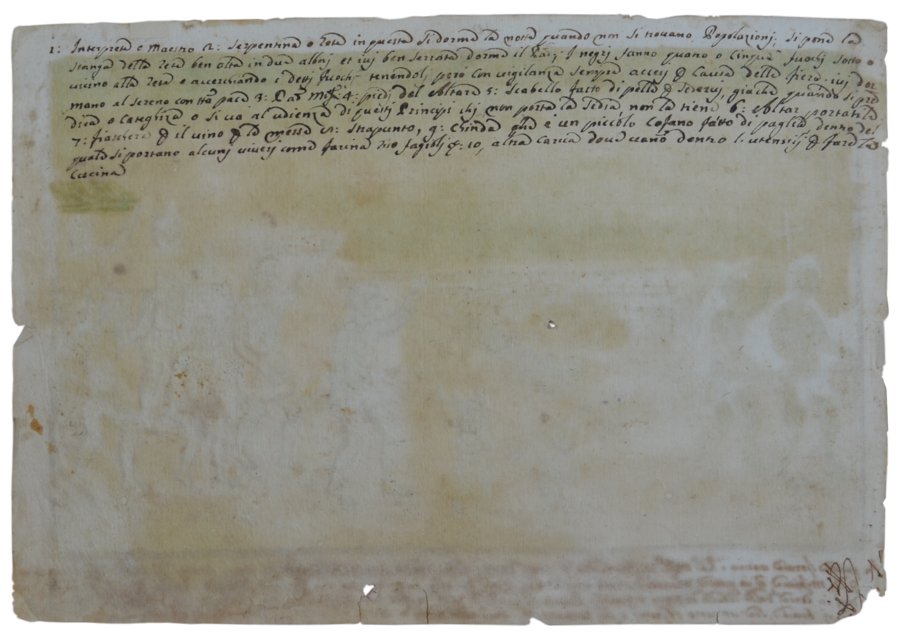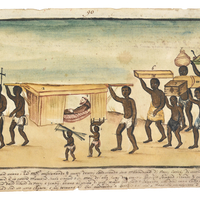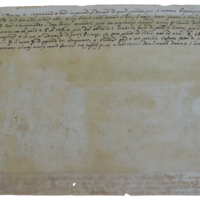PW090: In this manner the Missionary Fathers go missionizing
In questa forma vanno i Padi Miss:i missionando p[er] questi deserti conducendo seco moltitudine di negri carichi di varie cose necessarie p[er] la missione e i questa maniera stan[n]o cinque o sei mesi del an[n]o furi del prorio Ospizio Sempre errando p[er] queste grandi solitudini in cerca delle libate1 de negri e gentili; escano al primo di Giug:o tempo que qua e Inverno; vol dire men caldo che nelli altri tempi benche sia un vero Agosto; e poi tornano al Osp:o gia [. . .] a Ottobre o al piu a Novb: che principiano le piogge # volta
[verso] 1: Interprete o Maestro2 2: serpentina o rete in questa si dorme la notte quando non si trovano Popolazioni; si pone la stanga della rete ben alta in due albori et ivi ben serrata dorme il Pad: ; I negri fanno quatro o cinque fuochi sotto o vicino alla rete e accerchiando e detti fuochi tenendoli però con vigilanza sempre accesi p[er] causa delle fiere; ivi dormano al sereno con t[u]ta pace 3: Pad: Miss:o 4: Piedi del Altare 5: scabello fatto di pelle per sedervi, giache quando si predica o catechiza o si va al udienza di questi Principi chi non porta la sedia non la tiene 6: Altar portatile 7: fiascheta p[er] il vino p[er] le messe 8: strapunto, 9: Chinda3 che é un Piccolo cofano fatto di paglia dentro del quale si portano alcuni viveri come farina riso fagioli &: 10, altra carica dove van[n]o dentro l’utensili p[er] fare la cucina
In this manner the Missionary Fathers go missionizing across these deserts bringing along a multitude of blacks loaded with various things necessary to the mission and in this manner they spend five or six months of the year away from their own Convent always wandering around these great wildernesses in search of the villages of the blacks and the heathens; they leave on the first of June, time that is here winter; I mean less hot than the other seasons even if it is a true August; and then they return to the Convent [. . .] in October or at the most in November because the rains start # times
[verso] 1: Interpreter or Maestro 2: serpentina or net in this one sleeps at night when no Village is found; the bar of the net is hung very high in two trees and the Father sleeps in there nice and tight; the blacks make four or five fires under or around the net and make a circle around the said fires, keeping them however with watchfulness always lit because of the wild animals; there they sleep serene and in all peace 3: Missionary Father 4: legs of the Altar 5: Stool made of leather to sit yourself since when one preaches or catechizes or goes to an audience with one of these Princes who does not bring a seat, does not have one 6: portable Altar 7: flask for the wine for Mass 8: mattress 9: chinda which is a small box made of straw inside of which one carries some food such as flour rice beans &: 10, another load in which are the cooking utensils.
- 1From Kimdundu, libata: village.
- 2From the Portuguese mestre, for mestre da igreja, an important function in the organization of the Kongo Catholic Church, see Inge Brinkman, “Kongo interpreters, travelling priests and political leaders in the Kongo Kingdom (15th-19th century),” International Journal of African Historical Studies 49, no. 2 (2016): 255-76; Fromont, Images on a Mission, 170-76.
- 3From Kimbundu, kinda: basket.




Add new comment